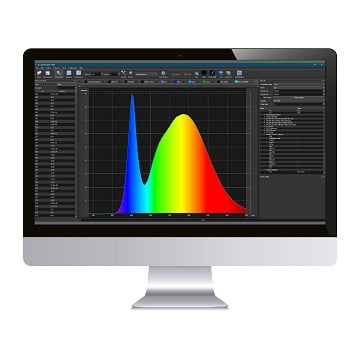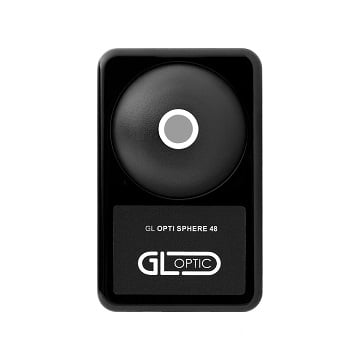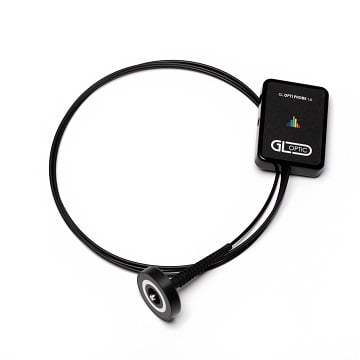GL SPECTIS 1.0 Touch + Flicker
Flicker measurement simplified
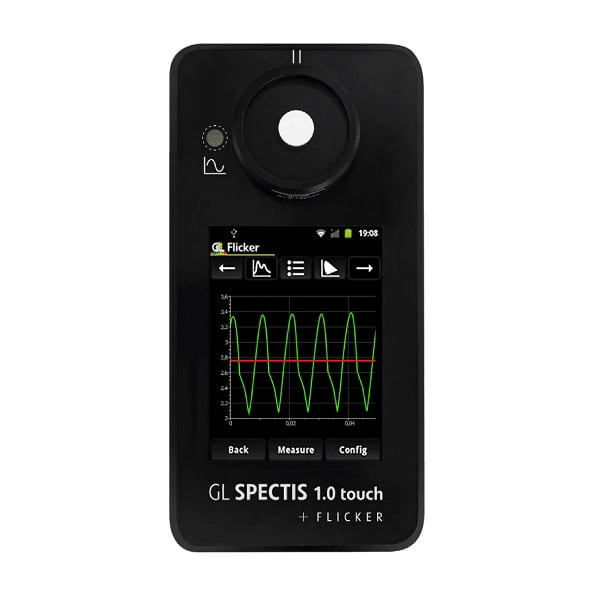
The ultimate portable light spectrometer
The best choice for flicker measurement
Tommorrow’s metrics, today
A true all-in-one instrument
Flexibility for leading industry
GL SPECTIS 1.0 Touch + Flicker Usage
Every important metric, one device
GL SPECTIS 1.0 Touch + Flicker Features
Reliable, precise and intuitively operated spectral instrument
Spectral and photodiode measurement
Plus all of the core features of the GL SPECTIS 1.0 Touch + Flicker:
- Self Contained Handheld Spectrometer
- Automatic Accessory Detection
- Dark current compensation
- Trigger Socket
- Photometric and Radiometric calibration
GL SPECTIS 1.0 Touch + Flicker Metrics
Measure light output and color together
- Spectral power distribution SPD
- Illumination [lx] or fc
- Irradiance [mWatt]
- Color: CRI, CCT, x,y
And optical flicker metrics like:
- Flicker frequency,
- Flicker index
- Flicker ratio
- SVM (Stroboscopic Visibility Measure)
- Pst LM (Short Term Perceptibility for light modulation) – available with GL SPECTROSOFT PRO/LAB only
- SAM (Stroboscopic Acceptability Metric)
- Mp (also called LRC Flicker Perception)
- VESA (Video Electronics Standards Association)
- JEITA (Japan Electronics and Information Technology Industries Association)
- Flicker Graph and FFT Graph available
GL SPECTIS 1.0 Touch + Flicker Specifications
APPLICATION | ||||
| Natural light, LEDs, halogen light, etc. | ||||
LED MEASUREMENT | ||||
| Illuminance [lx]* | 10 - 100 000 lx (for white LED) | |||
| 0.01 - 100 000 lx (Available with optional GL SALLI Diffusor) | ||||
| Luminance [cd/m2] | Available with optional GL OPTI PROBE | |||
| Luminous flux [lm] | Available with optional GL OPTI SPHERE | |||
| Luminous intensity [cd] | Calculated in GL SPECTROSOFT | |||
| Irradiance [W/m2] | 0.03 - 600 W/m2 ( for white LED) | |||
| Illuminance class | Class B - DIN 5032-7 | |||
| Class A - JIS C 1609-1:2006 | ||||
| Tolerance - cosine response (f2′) | < 3% (1,9%) | |||
| Spectral range ** | 340 - 780 nm (UVa-VIS) (GL SPECTIS 1.0 Touch + Flicker UVa - VIS ) | |||
FLICKER MEASUREMENTS | ||||
| Time | Sampling period | Upper cut-off frequency | Lower cut-off frequency | FFT frequency resolutions |
| 131 ms | 8 μs | 12,5 kHZ | 23 Hz | 7,63 |
| 262 ms | 16 μs | 6,25 kHz | 12 Hz | 3,81 |
| 524 ms | 32 μs | 3,125 kHz | 6 Hz | 1,91 |
| 1048 ms | 64 μs | 1,56 kHz | 3 Hz | 0,96 |
| 2097 ms | 128 μs | 781 Hz | 1,5 Hz | 0,48 |
| 4194 ms | 256 μs | 390 Hz | 0,8 Hz | 0,24 |
| 8388 ms | 512 μs | 195 Hz | 0,4 Hz | 0,12 |
| 16777 ms | 1024 μs | 97 Hz | 0,2 Hz | 0,06 |
| 33554 ms | 2048 μs | 48 Hz | 0,1 Hz | 0,03 |
| Frequency range | 0,01 Hz - 12,5 kHz | |||
| Maximum sampling rate | 125 kHz | |||
| Illuminance range | 0.1 lx - 15.000 lx | |||
| FFT plot visualization | ✓ | |||
| Time plot visualization | ✓ | |||
| Flicker index | ✓ | |||
| SVM (Stroboscopic Visibility Measure) | ✓ | |||
| Dominant frequency | ✓ | |||
CALCULATED VALUES | ||||
| CRI - Color rendering index according to CIE | Ra, R1-R14 | |||
| TM-30-15 | Rf, Rg, Colour Vector Graphic | |||
| CCT - Correlated color temperature according to CIE | ✓ | |||
| Color peak | ✓ | |||
| Color dominant | optional with GL SPECTROSOFT | |||
| Color position coordinates [x,y] according to CIE 1931 | ✓ | |||
| Color position coordinates [u’,v’] according to CIE 1976 | ✓ | |||
| Color position coordinates [u,v] according to CIE 1960 | ✓ | |||
| PAR / PPFD | ✓ | |||
| Color coordinate error | optional with GL SPECTROSOFT | |||
| Metametric index | optional with GL SPECTROSOFT | |||
| Binning | optional with GL SPECTROSOFT | |||
| Assessment in accordance with ISO 3664 | ✓ | |||
PHOTOMETRY / RADIOMETRY | ||||
| Sensor | CMOS image sensor | |||
| Number of pixels | 256 | |||
| Physical resolution / datapoint interval | ~ 1.7 nm | |||
| Wavelength reproducibility | 0.5 nm | |||
| Integration time | 2,6 ms - 10 s | |||
| A/D converter | 16 bit | |||
| Signal-to-noise ratio | 1000:1 | |||
| Stray light | 2*10 E-3 | |||
| Optical resolution / FWHM | 10 nm | |||
| Uncertainty of spectroradiometric measurement | < 3% | |||
| Flicker compensation | ✓ | |||
| Temperature sensor and dark current compensation | ✓ | |||
| Uncertainty of color coordinates*** | 0.0015 | |||
| Automatic accessory detection | ✓ | |||
GENERAL PROPERTIES | ||||
| Operating system | Android | |||
| Internal power supply | lithium-polymer battery 3500 mAh | |||
| Maximum current draw | 600 mA | |||
| External power supply | USB mini socket: 5 V, 1 A | |||
| Automatic shut-off | ✓ | |||
| Battery life | up to 6 h***** | |||
| Operating temperature | 5-35°C | |||
| Dimensions [H x W x D] | 74.5 mm x 145.5 mm x 36.6 mm (with standard diffusor) | |||
| Weight | 349 g | |||
| Tripod adapter | ✓ | |||
INTERFACE & MEMORY | ||||
| USB | USB 2.0 | |||
| Trigger | MQ172, 4-pin, programmable | |||
| SD Card slot | micro SD 16 GB | |||
| Measurement result storage | Auto / 16 GB microSD | |||
| Data format | XML | |||
| Fiber optic connector | Optional SMA905D | |||
DISPLAY & OPERATION | ||||
| Display | 3,5" color LCD ( 240 x 320 px) | |||
| Operation | Touch Screen, PC / Notebook | |||
SOFTWARE | ||||
| Software | Optional GL SPECTROSOFT Basic / Pro / Lab | |||
ORDERING INFORMATION | ||||
| Case | ✓ | |||
| Battery | ✓ | |||
| USB cable | ✓ | |||
| Power supply | ✓ | |||
| Leash | ✓ | |||
| Display protection foil | ✓ | |||
| 4 GB microSD card | ✓ | |||
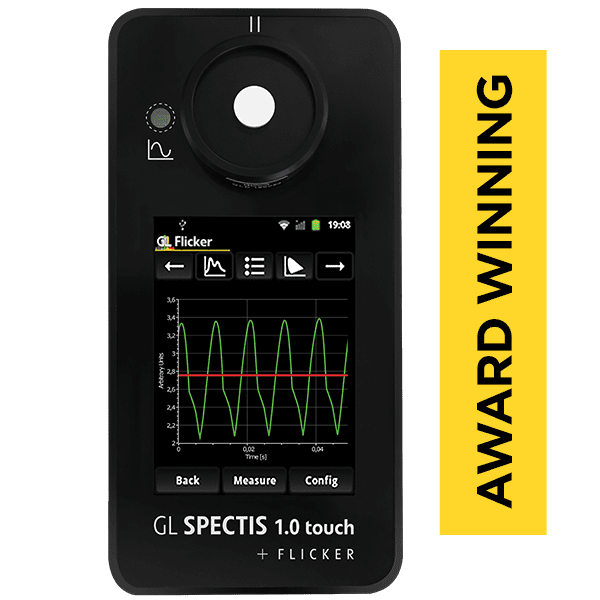
Finalist in the Sapphire Awards 2018 by LEDs Magazine
More than just a handheld
Accessories for a range of applications

Human centric metrics
Measure lighting installation to check illumination [lx], CCT, CRI, TM 30-15 flicker index, flicker percent and the SVM for visual effects along with the circadian metrics like EML and S/P ratio.

TV and studio light flicker
Use our GL SPECTIS 1.0 Touch + Flicker light spectrometer to measure very high frequencies up to 12 kHz which are important for broadcasting and studio lighting evaluation. This will also include CCT, CRI and TLCI indices verified.

Flux and color of LEDs
Connect with our GL OPTI SPHERE 48 to measure flux and color of single LEDs. This set supports binning verification and quality control during development and incoming QC of LEDs, drivers and other components.

Luminance and radiance
Available luminance optical probes can be connected and calibrated with our device to measure flat emitting surfaces like displays, screens and back lights. The coding system installed in our spectrometer will automatically download calibration file and measure [cd/m2]. Check available ADDITIONAL PROBES.
Highest quality sensors and components
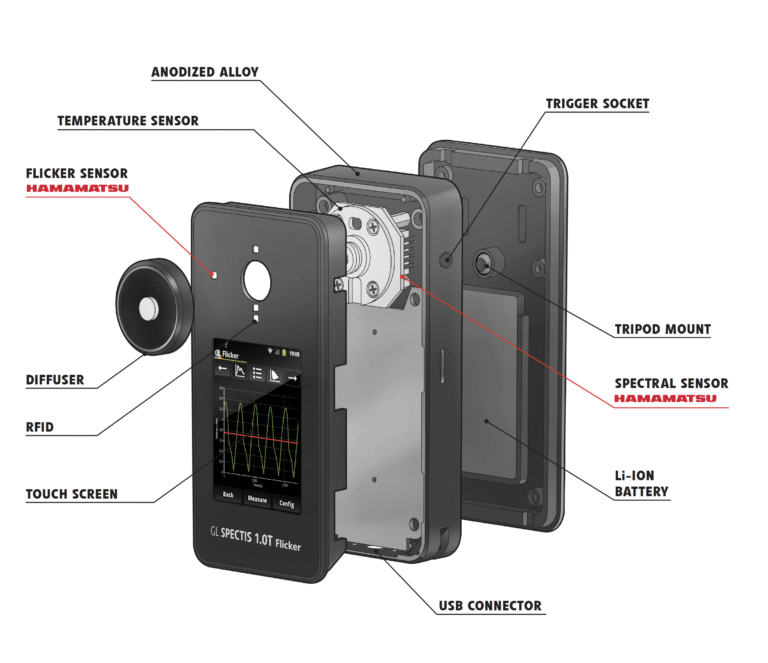
Related products
GL SPECTROSOFT M
GL OPTI SPHERE 48
GL OPTI PROBE 1.0.10 Luminance
